


The article highlights the important cardiac fatigue symptoms that elderly patients should be aware of to identify potential heart health issues. It gently emphasizes that recognizing these symptoms—such as persistent fatigue, shortness of breath, and chest discomfort—is vital for ensuring timely medical evaluation and intervention. These symptoms can indicate serious cardiovascular conditions that require immediate attention, and understanding them can empower patients to seek the help they need.
In addition to this, we want you to feel supported in your health journey. It’s natural to feel hesitant or anxious about health concerns, but being aware of these signs can lead to better outcomes. If you or a loved one experiences any of these symptoms, please know that reaching out for help is a strong and important step.
Furthermore, remember that you are not alone in this. Many people share similar concerns, and there are professionals ready to provide the care and support you deserve. Acknowledging these feelings and taking action can make a significant difference in your heart health.
Recognizing the subtle signs of cardiac fatigue is crucial, especially for older adults whose health can decline rapidly. Fatigue, often dismissed as mere tiredness, may signal serious cardiovascular issues that require immediate attention. Did you know that as many as 76% of seniors report persistent exhaustion following heart events? This statistic underscores the importance of understanding these symptoms. What if the fatigue that seems harmless is actually a warning sign of a potentially life-threatening condition? This article explores ten critical cardiac fatigue symptoms that every elderly patient should be aware of, empowering individuals and caregivers to take proactive steps toward better heart health.
Fatigue, especially when considering cardiac fatigue symptoms, is more than just a feeling of tiredness; it can be a significant indicator of underlying cardiovascular issues, particularly in older adults. This persistent exhaustion, which often does not improve with rest, may signal serious conditions such as heart failure, coronary artery disease, or even cardiac fatigue symptoms. Recognizing cardiac fatigue symptoms as a potential red flag is crucial for both patients and caregivers, as it can lead to timely medical evaluation and intervention.
Research indicates that 76% of older adults experience persistent fatigue following a myocardial infarction (MI), underscoring how common this issue is among the elderly. Cardiologists stress that unexplained fatigue or sudden drops in energy can be critical early signs of heart problems, often referred to as cardiac fatigue symptoms, which are frequently overlooked even when other symptoms are absent. Cardiac fatigue symptoms may indicate reduced heart output, leading to insufficient oxygen delivery to the body, especially for those with risk factors such as family history, high blood pressure, high cholesterol, or diabetes.
At Amavita Heart and Vascular Health, we provide comprehensive cardiac evaluations to identify the specific causes of fatigue. By utilizing advanced diagnostic tools, including our AI-powered CardioElite™ program, we offer real-time guidance and precise imaging for early detection of cardiovascular issues. This innovative approach not only enhances patient outcomes but also allows for the creation of personalized treatment plans aimed at improving heart function and restoring energy levels.
Real-life experiences highlight the importance of recognizing this symptom. Many seniors report experiencing cardiac fatigue symptoms as a precursor to more severe cardiac events, emphasizing the need for awareness and proactive health management. By understanding the implications of fatigue, individuals can seek appropriate treatment, potentially slowing the progression of cardiovascular disease and improving overall health outcomes. Identifying cardiac fatigue symptoms as a signal of cardiovascular issues is not just beneficial; it can be life-saving. Therefore, if you or a loved one is experiencing persistent fatigue, it is vital to consult a healthcare provider for a thorough evaluation.
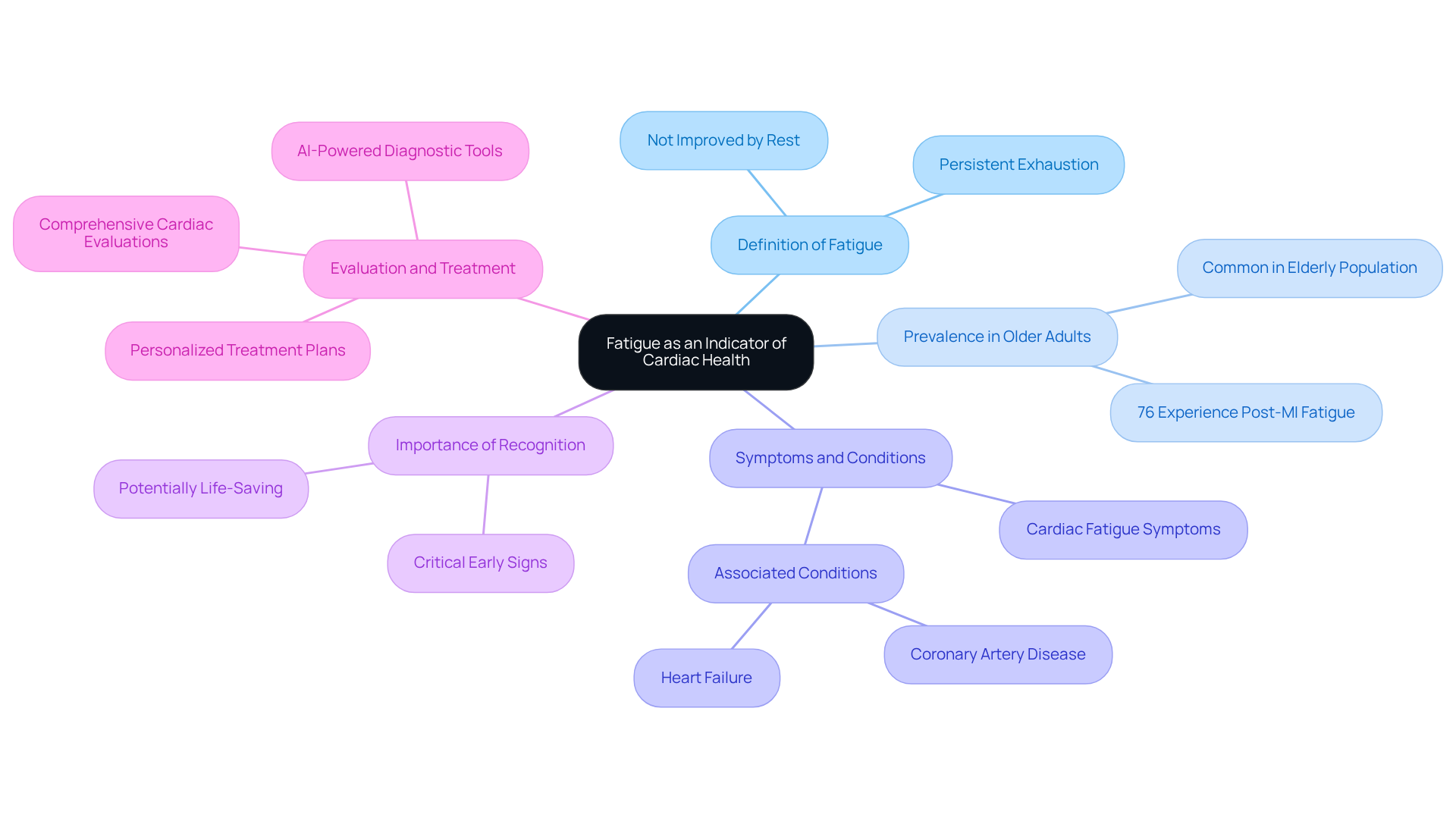
Shortness of breath, or dyspnea, is a common concern for many older individuals experiencing cardiac fatigue symptoms related to cardiovascular problems. This symptom often arises during physical activity or, in more severe cases, even at rest, which may indicate cardiac fatigue symptoms. Such occurrences can indicate that the heart is not pumping effectively, which may result in cardiac fatigue symptoms and lead to fluid buildup in the lungs. Recent research reveals that approximately 80% of elderly individuals with cardiovascular failure experience dyspnea, making it a critical warning sign that should not be overlooked.
Heart specialists highlight the importance of recognizing dyspnea as a significant indicator of worsening cardiac fatigue symptoms. For instance, one specialist notes, "difficulty breathing in cardiac failure suggests the organ is not pumping effectively." This underscores the urgent need for medical assessment when such a symptom presents itself. Furthermore, dyspnea can contribute to increased fatigue, swelling, and rapid weight gain, complicating the patient's condition and potentially leading to cardiac fatigue symptoms.
Valve issues can also lead to shortness of breath, as they may prevent the valves from opening or closing properly, causing the heart to work harder. At Amavita Heart and Vascular Health, Dr. Martinez-Clark specializes in minimally invasive valve treatments that can repair or replace damaged valves without the need for open-heart surgery. These procedures can significantly enhance breathing and energy levels, often allowing for same-day discharge.
Recent news emphasizes the necessity of being aware of dyspnea as a sign of cardiac failure in seniors, particularly since it can escalate quickly. Seniors should be vigilant about any changes in their breathing patterns, especially if they notice increased shortness of breath or other cardiac fatigue symptoms while resting or lying down. Other warning signs that may require emergency care include:
Seeking prompt medical attention can be vital for effectively managing cardiac failure and addressing cardiac fatigue symptoms to prevent further complications.
Moreover, the innovative AI-powered CardioElite™ program at Amavita enhances early detection and healthcare outcomes by utilizing portable, FDA-cleared AI ultrasound technology for bedside cardiac diagnostics. This system provides real-time assistance for precise imaging and generates reports on cardiac structure and function within minutes, facilitating informed decisions and timely interventions.
To ensure optimal cardiovascular well-being, elderly individuals are encouraged to closely monitor their symptoms and consult their healthcare provider if they notice any significant changes in their breathing or overall condition.

Swelling in the feet and ankles, known as peripheral edema, can be a significant indicator of cardiovascular health, especially in elderly patients. This condition arises when the heart struggles to pump blood effectively, leading to fluid accumulation in the lower extremities. It's important to note that nearly 50% of people with heart disease experience some form of swelling, making it a common concern among older adults with heart failure. Additionally, this swelling may be linked to fatigue during physical activity, as both symptoms can stem from underlying heart issues.
Recognizing this symptom is crucial. For example, persistent swelling in both ankles might signal potential cardiac problems, warranting immediate medical evaluation. Cardiologists point out that swelling often worsens after long periods of standing or sitting, and may be accompanied by tight skin or indentations from socks, indicating fluid retention rather than simple weight gain.
Recent studies indicate that fluid retention can cause sudden weight gain, which is often mistaken for normal fluctuations. This serves as a reminder to stay vigilant; gaining more than 2 kilograms (about 5 pounds) in a short timeframe may suggest worsening cardiac function. Specialists advise that any new or ongoing swelling should prompt a conversation with a healthcare professional to assess heart health and explore fluid management options.
Dr. Kunal Sood, an anaesthesiologist, emphasizes that changes in the lower limbs can reflect what's happening within the cardiovascular system. He encourages individuals to listen to their bodies, as symptoms like swelling can act as early warning signs of more serious health issues. At Amavita, we conduct thorough cardiac assessments to identify the root causes of fatigue and swelling, enabling us to create tailored treatment plans that focus on improving heart function and restoring energy levels. By recognizing and addressing these signs promptly, we can significantly enhance outcomes for older individuals facing heart-related challenges.
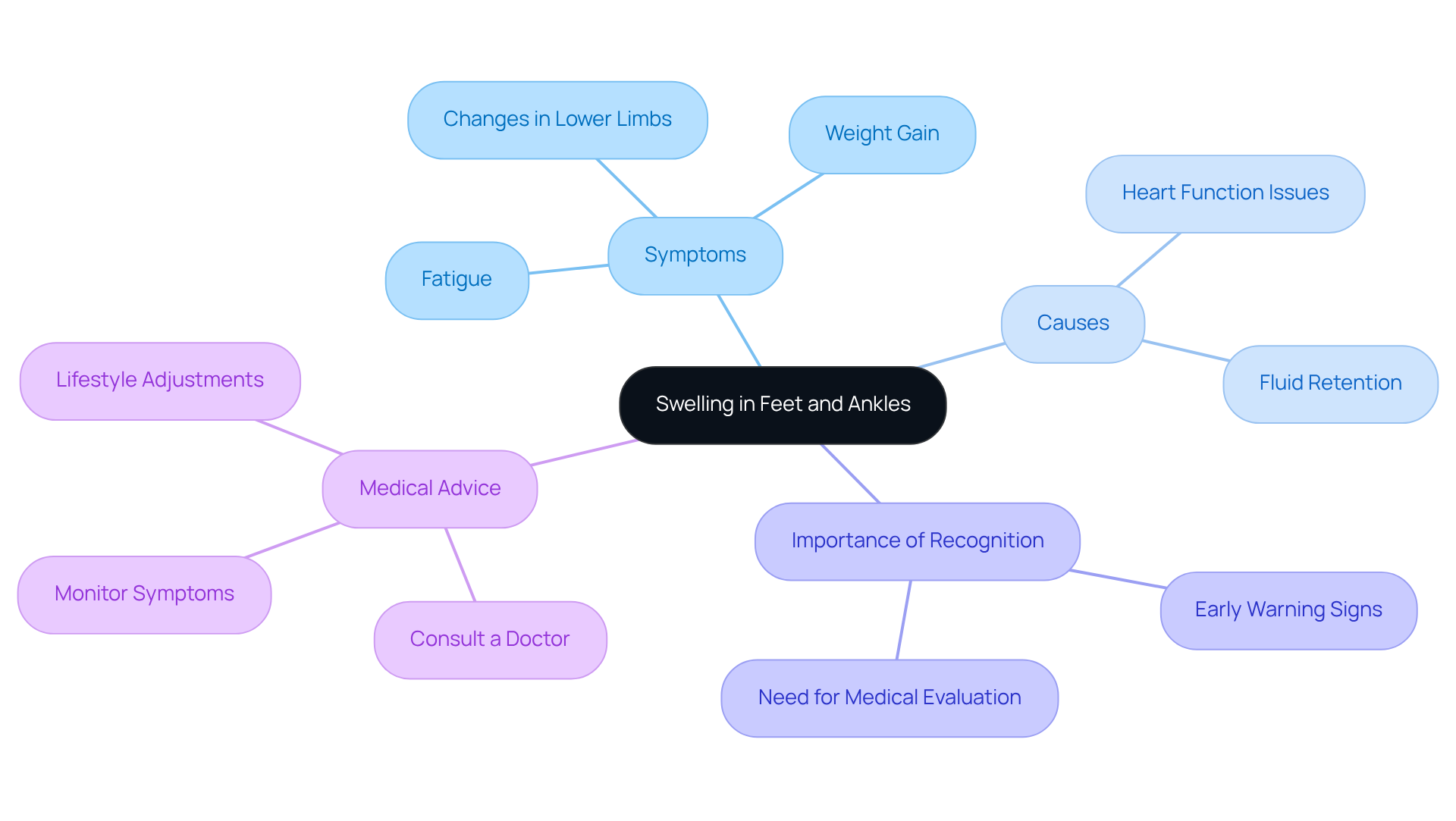
Chest discomfort often feels like pressure, tightness, or pain, and it may radiate to your arms, neck, or jaw. For older individuals, these signs can indicate angina or even a heart attack. It’s important to know that over 11 million people in the U.S. experience angina, with older adults being particularly vulnerable. At Amavita Heart and Vascular Health®, we want to emphasize that any new or worsening chest discomfort should prompt immediate medical attention. Seeking help quickly can significantly improve outcomes.
Our preventive cardiology strategy combines advanced risk evaluation tools with tailored interventions to address these concerns effectively. For instance, stable angina episodes typically subside within five minutes of rest. However, if these issues persist or worsen, it’s crucial to seek emergency assistance. Recognizing these cardiac fatigue symptoms promptly can be lifesaving, especially since many cardiac events present unusual symptoms in older individuals, often mistaken for less serious conditions.
We are proud to offer innovative AI-driven diagnostic technology that utilizes a portable, FDA-approved ultrasound for bedside heart diagnostics. This technology provides real-time assistance for precise imaging, enhancing early detection and allowing for informed decisions and personalized treatment plans.
Understanding and responding to chest discomfort is vital for maintaining heart health in our community. Remember, you are not alone in this journey, and we are here to support you every step of the way.
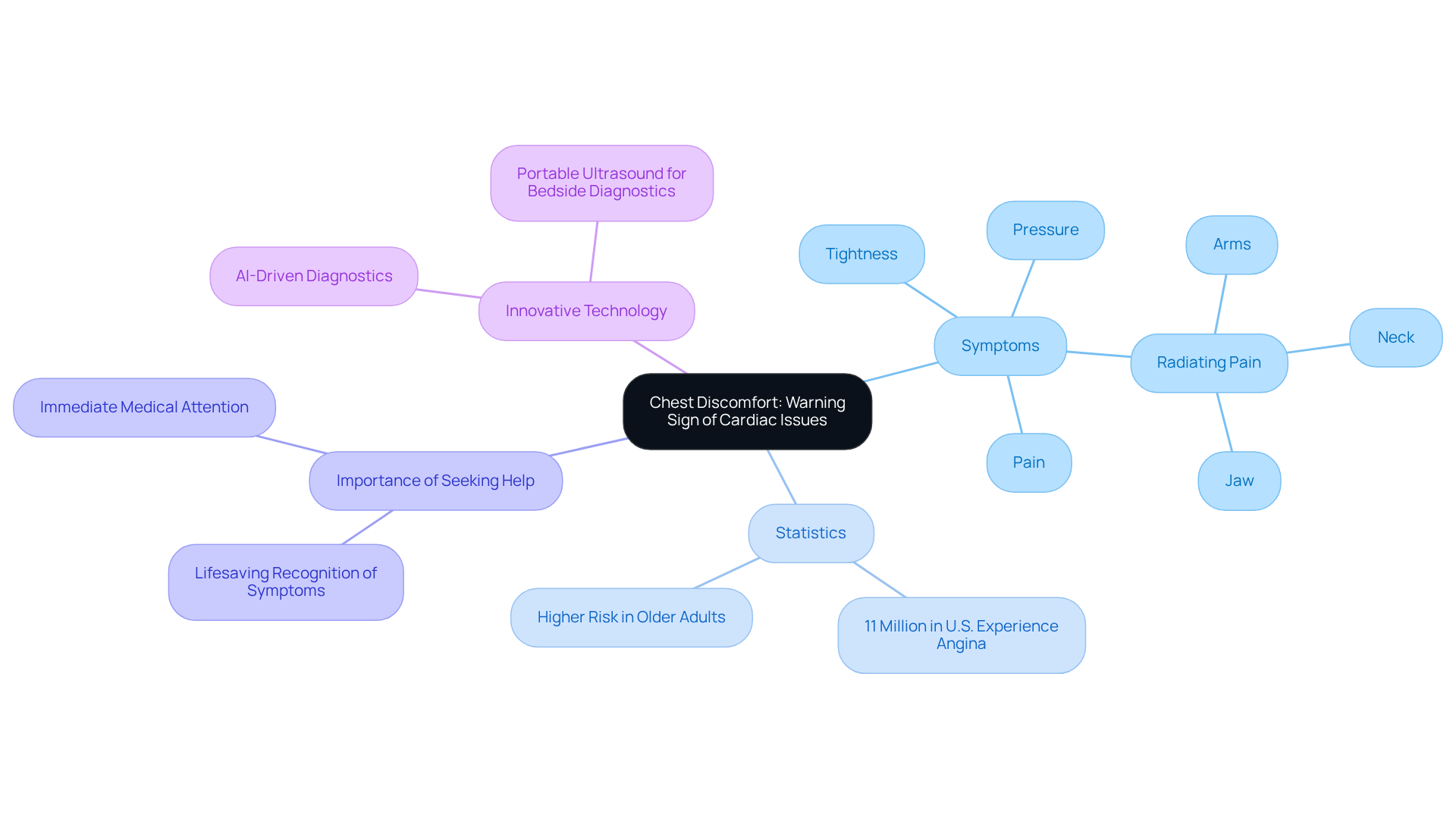
Heart palpitations can often feel like a fluttering or racing sensation in your chest, which can be quite unsettling. For many, these sensations are benign. However, for older individuals, they may signal more serious conditions like arrhythmias or other cardiac issues. At Amavita Heart and Vascular Health, we truly understand how concerning these symptoms can be, and we are here to help you navigate them with care.
Our specialists are dedicated to providing comprehensive arrhythmia management. We utilize advanced monitoring technology to accurately identify the specific type of arrhythmia you may be experiencing. If you find yourself dealing with frequent or severe palpitations, we encourage you to consult your healthcare provider. This step is crucial for further evaluation and potential monitoring, ensuring that any underlying issues are addressed with expert care and innovative, minimally invasive treatments.
Remember, you are not alone in this journey. We are committed to supporting you every step of the way, ensuring that your concerns are heard and addressed with compassion.
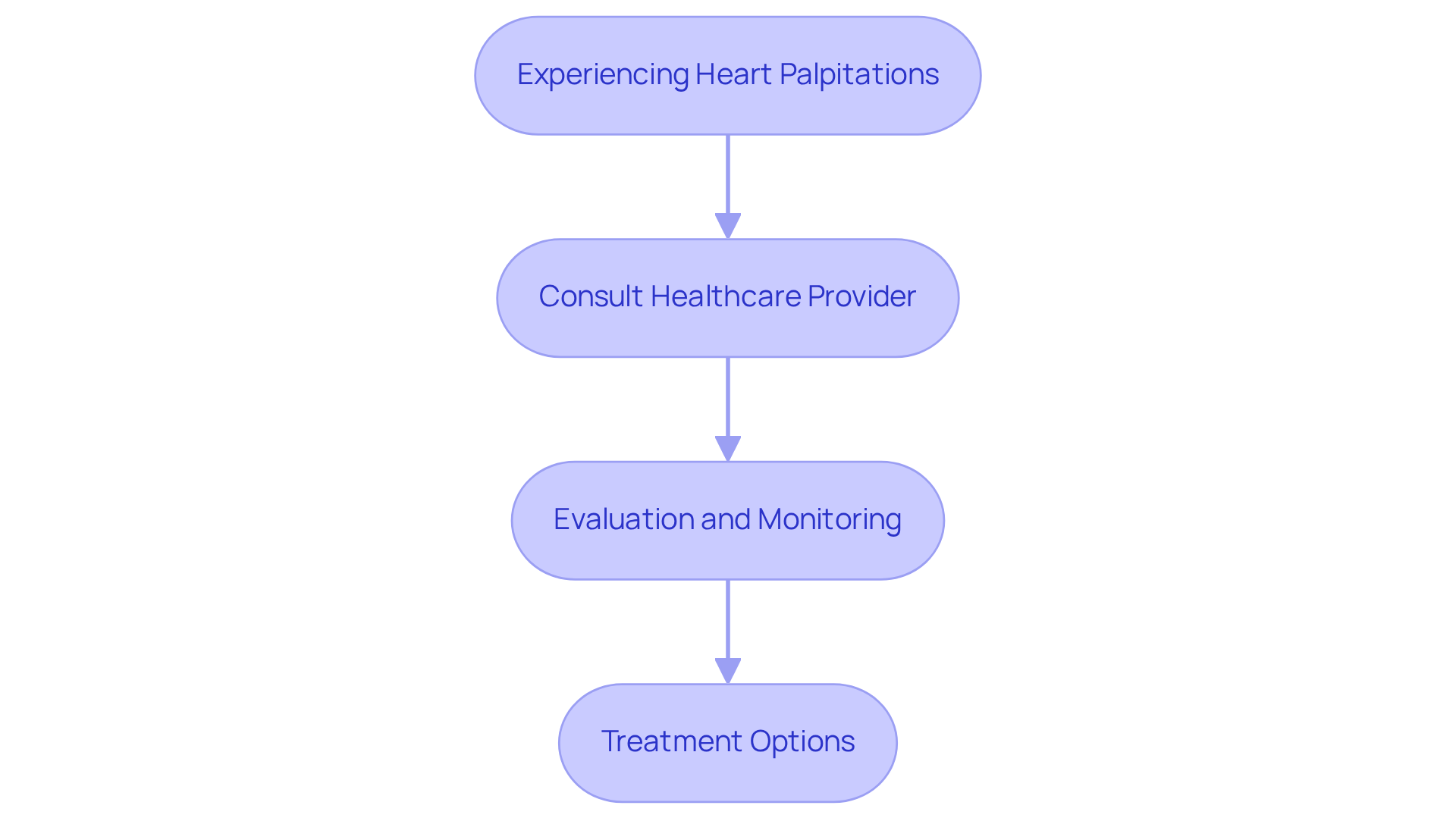
Unexplained discomforts or pains, especially in the upper body, can be concerning and may indicate cardiovascular issues, particularly among older individuals. Discomfort in the shoulders, arms, back, neck, or jaw might not align with typical heart attack symptoms, yet they can signal serious conditions like myocardial infarction. Research shows that over 50% of cardiac arrest patients experience early warning signs, often subtle or unusual, especially in seniors. For example, many older adults may report cardiac fatigue symptoms or mild discomfort, which they might dismiss as unimportant. Additionally, risk factors such as family history, high blood pressure, high cholesterol, and diabetes can increase the likelihood of cardiac events in this population.
Heart specialists emphasize the importance of reporting any unusual discomfort that may indicate cardiac fatigue symptoms. As Dr. Lloyd-Jones noted, 'Identifying unusual indications can result in prompt care and avert serious cardiac injury.' This is particularly crucial, as older adults and those with diabetes may exhibit signs of a cardiac event differently than younger people, often presenting ambiguous indicators that can be mistaken for other conditions.
Real-world examples illustrate this issue: many seniors have experienced heart attacks with symptoms that diverge from the classic chest pain narrative. A study highlighted that women are more likely than men to overlook warning signs, potentially leading to delayed treatment and worse outcomes. Moreover, chest pain or discomfort is often described as feeling like an elephant resting on one's chest, underscoring the importance of recognizing this sign.
In summary, any unexplained upper body discomfort should be taken seriously. Patients are encouraged to communicate these signs, especially when accompanied by other alert indicators, as early intervention can significantly improve outcomes. With the innovative AI-powered diagnostic technology of the Amavita CardioElite™ program, we enhance early detection and health outcomes, ensuring that timely care is within reach. If you experience any concerning symptoms, please seek immediate medical attention by calling 911.
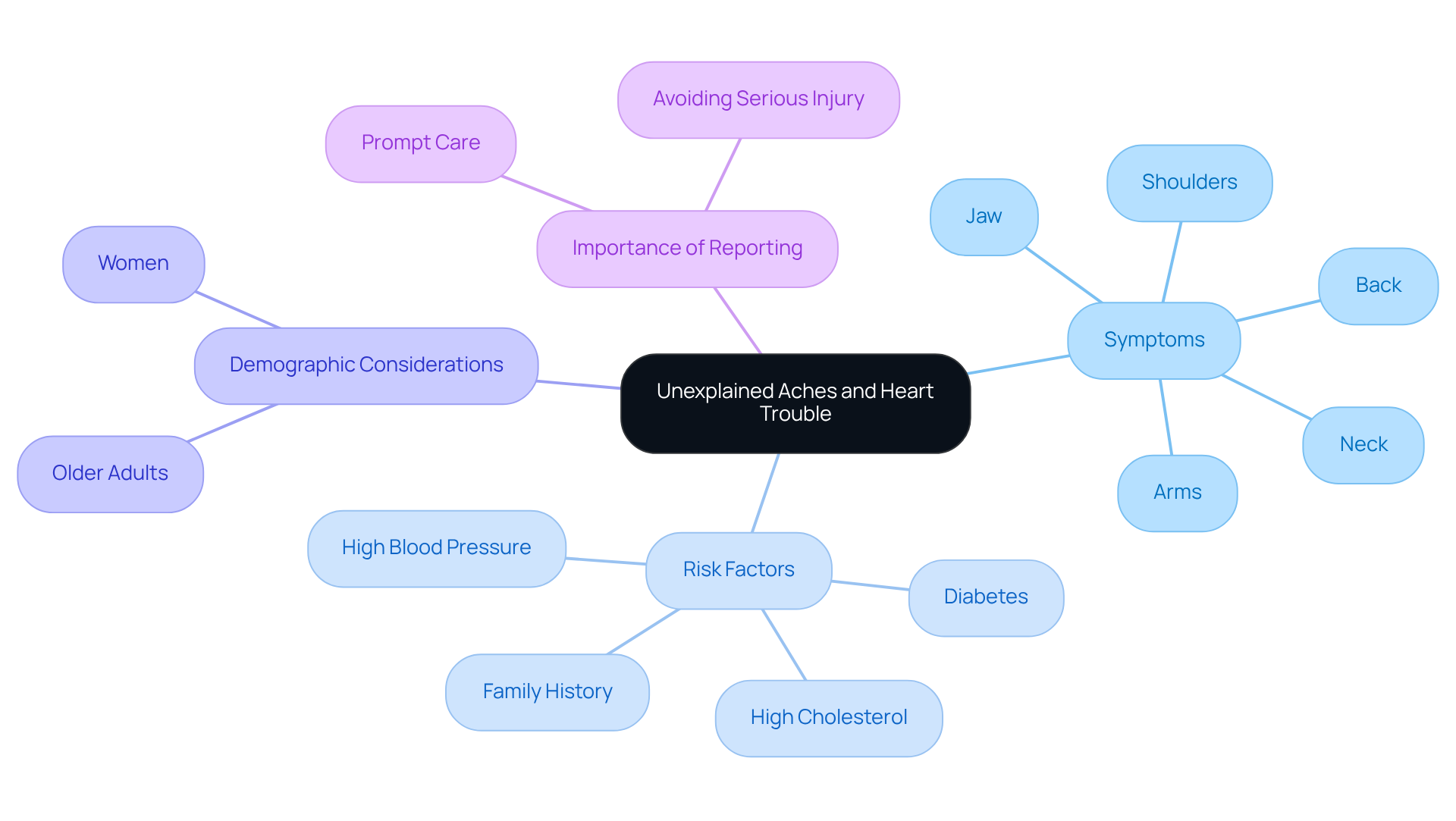
Chronic fatigue that persists even after adequate rest can be a significant indication of potential cardiac fatigue symptoms, especially in older adults. This fatigue, which can be categorized as one of the cardiac fatigue symptoms, often stems from the heart's reduced ability to pump blood effectively, leading to insufficient oxygen delivery to the body’s tissues. Cardiologists emphasize that the presence of cardiac fatigue symptoms can be a subtle yet crucial sign of cardiac failure.
Interestingly, some have noted that cardiac fatigue symptoms may be the only symptom present in certain individuals, particularly women and those living with diabetes. In fact, heart failure impacts around 6 million people in the U.S., with studies indicating that 1 in 5 individuals will face this condition at some point in their lives.
For older adults, ongoing cardiac fatigue symptoms are not merely a minor inconvenience; they can significantly affect one’s quality of life and may indicate underlying heart problems. If you or someone you know is experiencing this symptom, it’s essential to consult a healthcare provider for a comprehensive cardiac evaluation. Many seniors report experiencing cardiac fatigue symptoms, such as feeling unusually tired or lacking in energy, which can be connected to their cardiovascular health. Addressing these signs promptly can lead to better management of cardiovascular issues and improved overall well-being.
Have you noticed changes in your energy levels? It’s important to take these feelings seriously and seek support. Remember, you’re not alone in this journey, and there are caring professionals ready to help you navigate your health concerns.
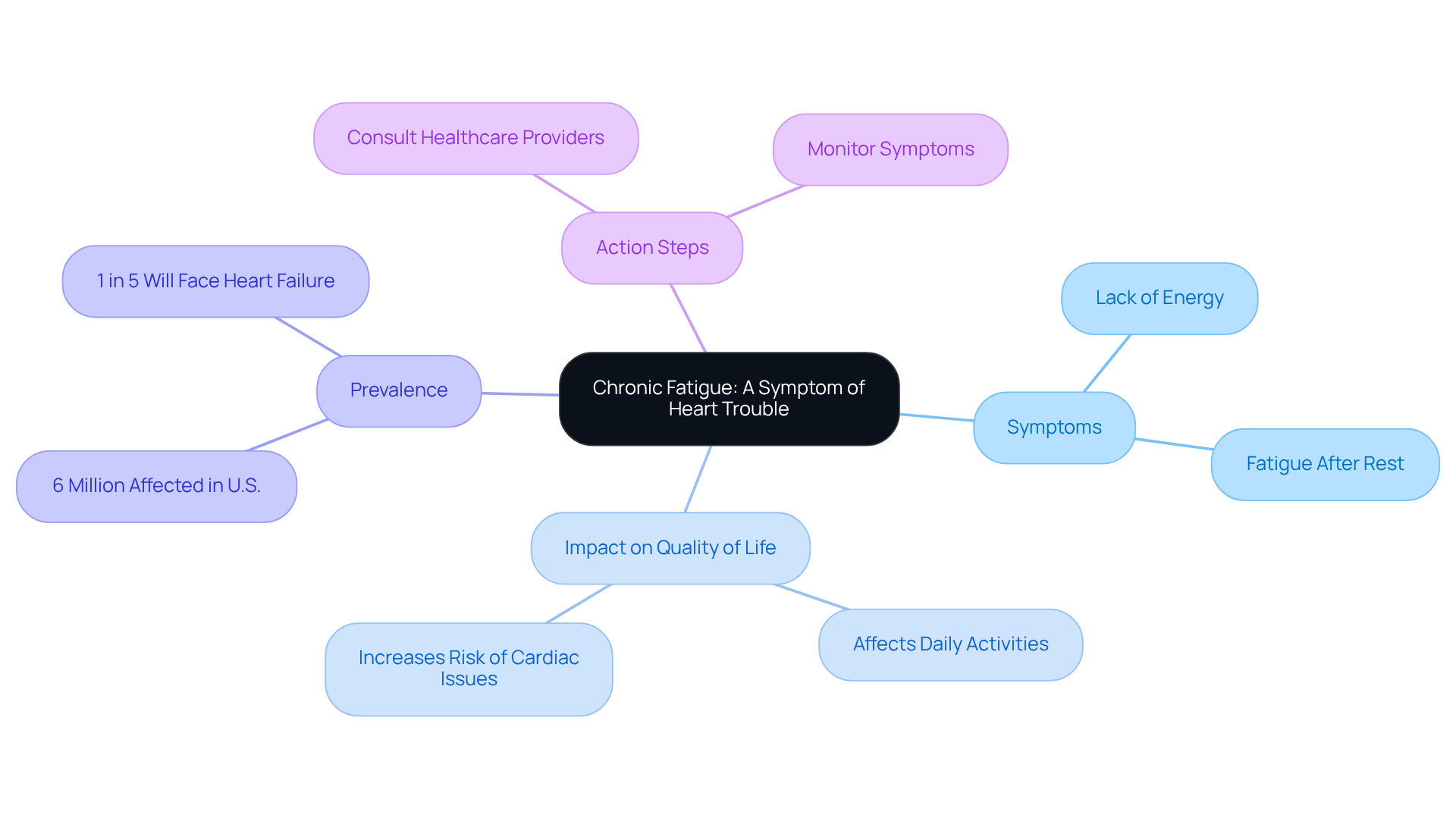
Dizziness or lightheadedness can be concerning, as it may signal that the organ responsible for circulation isn't pumping effectively, leading to reduced blood flow to the brain. This symptom can be especially alarming for older individuals, significantly increasing the risk of falls. In fact, studies show that older adults experiencing dizziness are over 60% more likely to fall. This highlights the importance of addressing such issues promptly. A meta-analysis reveals that one in three individuals aged 65 and older experience dizziness, underscoring its prevalence in this demographic.
If you find that dizziness occurs frequently or is severe, it is crucial to seek medical evaluation. Identifying the underlying cause and implementing appropriate management strategies can make a significant difference. At Amavita Heart and Vascular Health®, we conduct thorough evaluations of cardiovascular health using advanced risk assessment tools. This helps us understand the connection between dizziness and circulatory wellness.
Cardiologists, including Dr. Toby Ellmers, emphasize that even non-bothersome dizzy spells should prompt an appointment with a healthcare provider. Our innovative AI-powered diagnostic technology ensures accurate imaging and early detection, enabling informed decisions about treatment. By acknowledging the link between dizziness and heart health, you can take proactive measures to protect your well-being through customized care tailored to your unique conditions and lifestyle. Remember, you are not alone in this, and we are here to support you every step of the way.
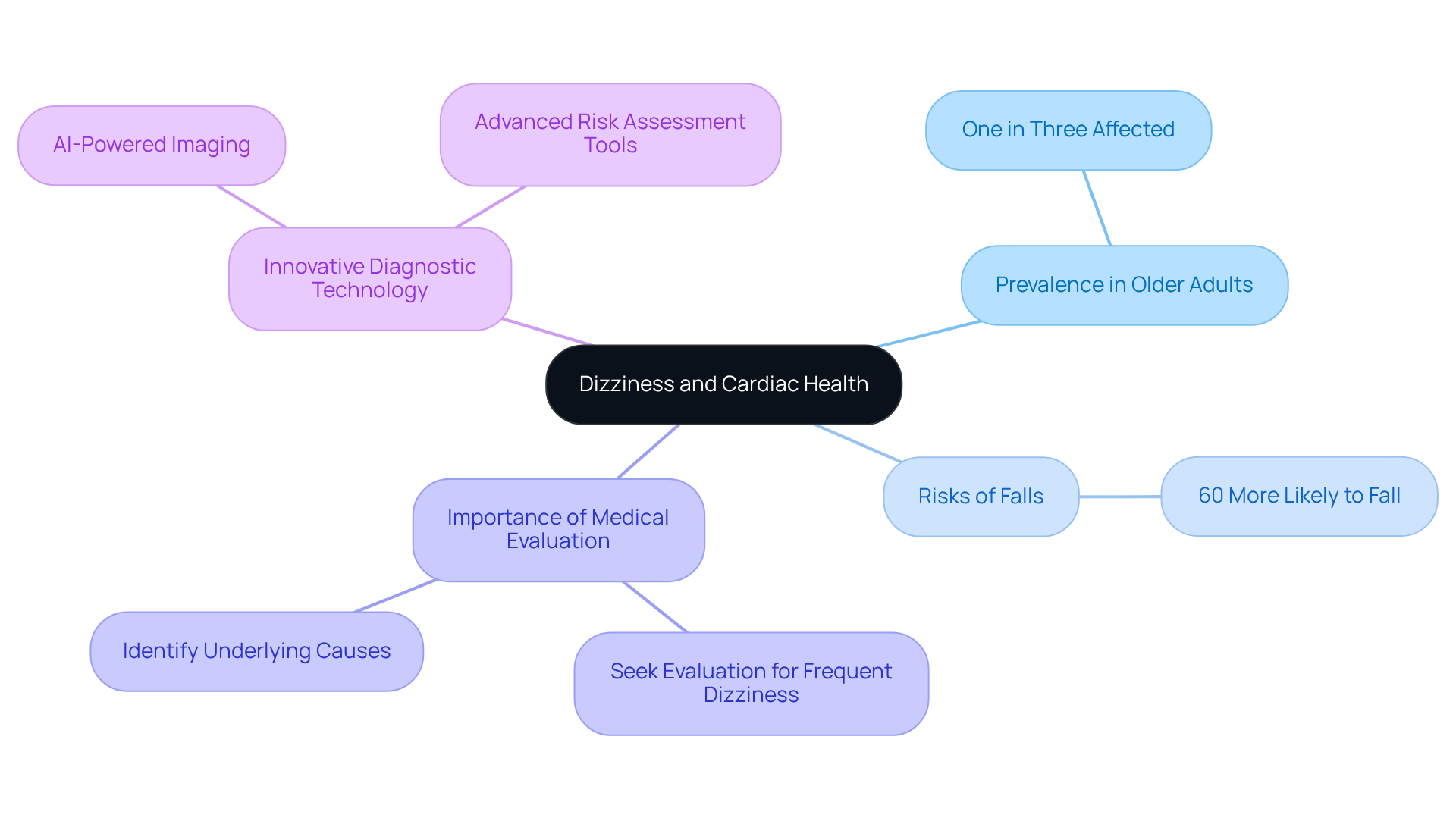
Nausea and indigestion are often dismissed as mere gastrointestinal issues, but for older patients, they can serve as critical warning signs of cardiac problems. These cardiac fatigue symptoms may occur during a cardiac event or as a consequence of heart failure. In fact, research indicates that around 30% of women report nausea as an early warning sign of a cardiac event, underscoring the need for heightened awareness among older adults.
Additionally, persistent discomfort in the upper abdomen can be misleading; it may resemble digestive troubles while actually indicating cardiac distress. If you experience ongoing chest discomfort or indigestion, especially when there is no obvious cause, it could indicate cardiac fatigue symptoms.
At Amavita Vascular Health®, we prioritize comprehensive evaluations to assess risk factors and create personalized strategies, including lifestyle changes, to help reduce the risk of a cardiac event. Experts emphasize that any unexplained gastrointestinal symptoms, such as cardiac fatigue symptoms, should prompt immediate consultation with a healthcare provider for a thorough evaluation.
Recognizing these subtle signs can be crucial in preventing serious complications and ensuring timely medical intervention. To take proactive steps for your cardiovascular health, we encourage you to schedule an appointment for a comprehensive evaluation.
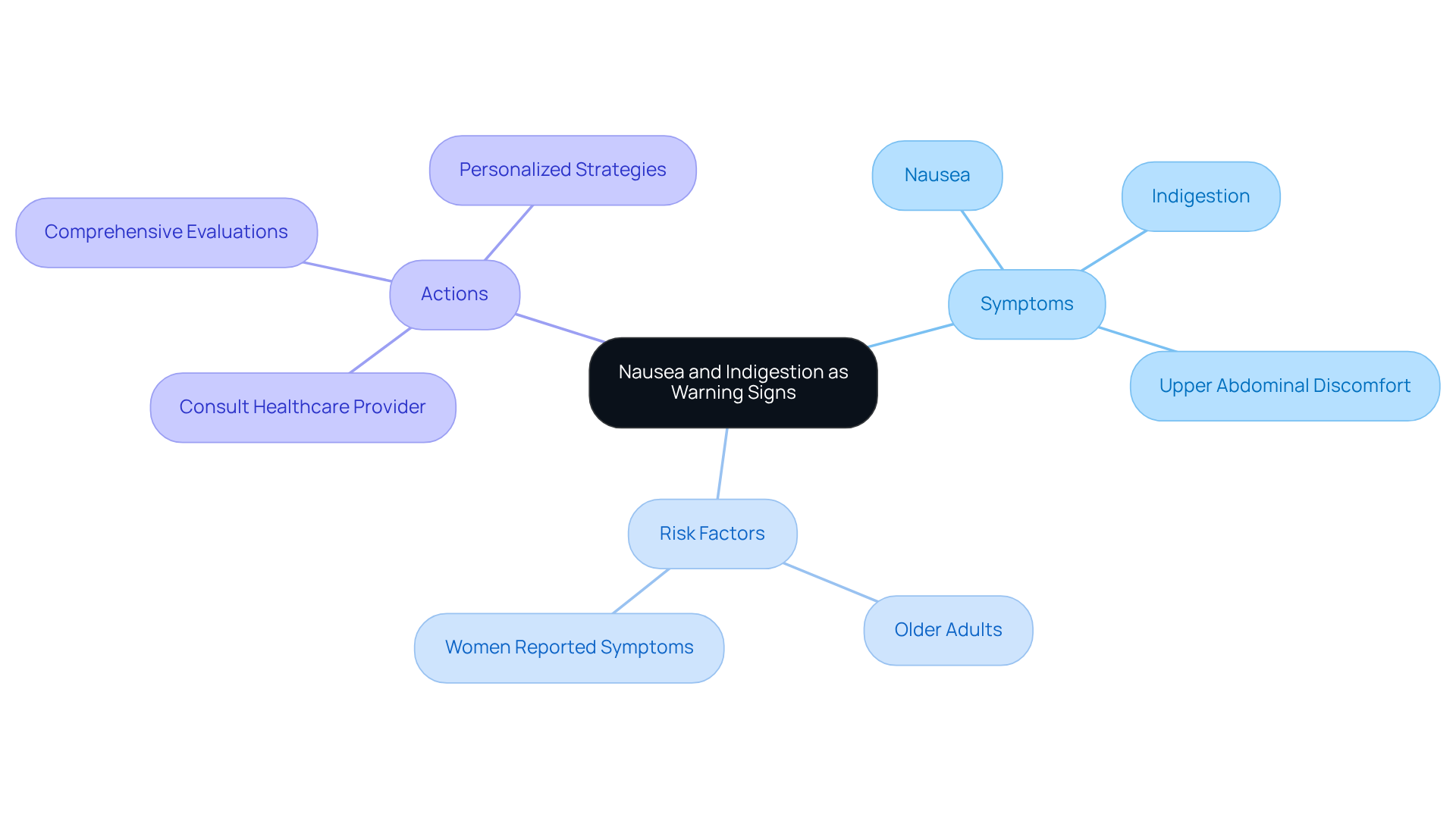
Regular check-ups with a cardiovascular specialist, such as those at Amavita Heart and Vascular Health®, are essential for monitoring cardiac health in elderly patients. These assessments play a crucial role in the early identification of cardiovascular issues, which often present without symptoms during their initial stages. Cardiologists remind us that 'one of the primary advantages of regular cardiovascular check-ups is the early identification of related issues.' Many seniors live with high blood pressure and high cholesterol without realizing it, making routine assessments vital for timely intervention.
Furthermore, routine cardiovascular check-ups provide healthcare professionals with a deeper understanding of a person’s unique health profile. This insight allows them to suggest tailored prevention strategies that can be life-changing. At Amavita, our preventive cardiology strategy combines advanced risk evaluation tools with personalized interventions, significantly lowering the risk of a cardiac event.
Research shows that seniors who participate in regular cardiovascular evaluations enjoy better management of chronic conditions, leading to an improved quality of life. Notably, participants with one cardiovascular disease had a Life’s Essential 8 score 9 points lower than those without cardiovascular disease, highlighting the significant impact of these issues on overall health.
With our aging population, the prevalence of undiagnosed heart conditions is a growing concern, underscoring the necessity for proactive heart health monitoring. Our innovative AI-powered CardioElite™ program enhances early detection and patient outcomes, ensuring that every patient receives the care and attention they deserve. Ultimately, our goal is to reduce the risk of serious cardiovascular events, fostering a healthier future for all.
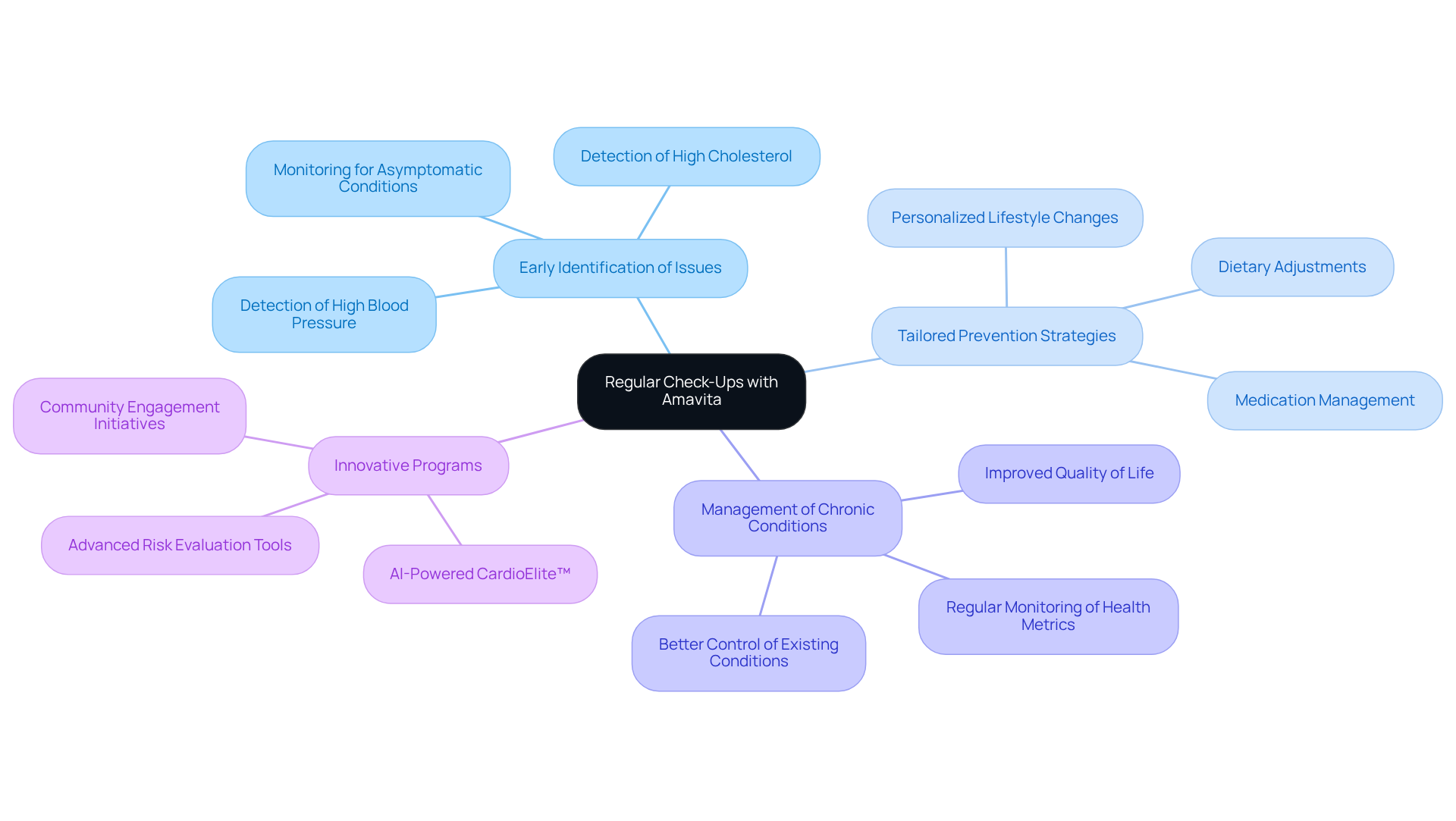
Recognizing the symptoms of cardiac fatigue is essential for maintaining heart health, especially among elderly patients. Persistent fatigue, shortness of breath, swelling in the extremities, and other related symptoms can serve as critical indicators of underlying cardiovascular issues. These signs should not be dismissed; addressing them promptly can prevent serious health complications.
Fatigue is prevalent and often associated with conditions like heart failure and coronary artery disease. Symptoms such as chest discomfort, heart palpitations, and dizziness further underline the importance of proactive health management. Regular check-ups and advanced diagnostic tools, like those offered by Amavita Heart and Vascular Health, are vital for early detection and personalized care, ultimately enhancing patient outcomes.
In conclusion, it is imperative for elderly individuals and their caregivers to remain vigilant about potential cardiac fatigue symptoms. By understanding the significance of these signs and seeking timely medical evaluation, proactive steps can be taken toward better heart health. Awareness and early intervention can not only improve quality of life but also be life-saving. Prioritize regular check-ups and do not hesitate to consult healthcare professionals if concerning symptoms arise, ensuring that cardiovascular well-being remains a top priority.
What is fatigue and why is it significant in relation to cardiac health?
Fatigue is more than just tiredness; it can indicate underlying cardiovascular issues, particularly in older adults. Persistent exhaustion that does not improve with rest may signal serious conditions like heart failure or coronary artery disease.
How common is fatigue among older adults after a myocardial infarction (MI)?
Research indicates that 76% of older adults experience persistent fatigue following a myocardial infarction (MI).
What are cardiac fatigue symptoms?
Cardiac fatigue symptoms include unexplained fatigue or sudden drops in energy, which may indicate reduced heart output and insufficient oxygen delivery to the body.
What factors increase the risk of experiencing cardiac fatigue symptoms?
Risk factors include family history, high blood pressure, high cholesterol, and diabetes.
How does Amavita Heart and Vascular Health address fatigue related to cardiac health?
Amavita provides comprehensive cardiac evaluations using advanced diagnostic tools, including the AI-powered CardioElite™ program, to identify the causes of fatigue and create personalized treatment plans.
What is shortness of breath and why is it important in assessing cardiac health?
Shortness of breath, or dyspnea, is a common symptom that can indicate cardiac fatigue symptoms and may arise during physical activity or at rest, suggesting the heart is not pumping effectively.
What percentage of elderly individuals with cardiovascular failure experience dyspnea?
Approximately 80% of elderly individuals with cardiovascular failure experience shortness of breath.
What are some warning signs that may require emergency care related to shortness of breath?
Warning signs include frequent dry cough, swelling in the extremities, and rapid weight gain.
What is peripheral edema and how does it relate to heart failure?
Peripheral edema is swelling in the feet and ankles caused by fluid accumulation due to the heart's inability to pump blood effectively. Nearly 50% of people with heart disease experience some form of swelling.
What should individuals do if they notice swelling in their ankles?
Persistent swelling in both ankles should prompt immediate medical evaluation to assess potential cardiac problems.
How can changes in lower limb swelling reflect cardiovascular health?
Changes in lower limb swelling can indicate underlying heart issues, and sudden weight gain from fluid retention may suggest worsening cardiac function.
What approach does Amavita take to manage symptoms like fatigue and swelling?
Amavita conducts thorough cardiac assessments to identify the root causes of fatigue and swelling, enabling tailored treatment plans to improve heart function and restore energy levels.